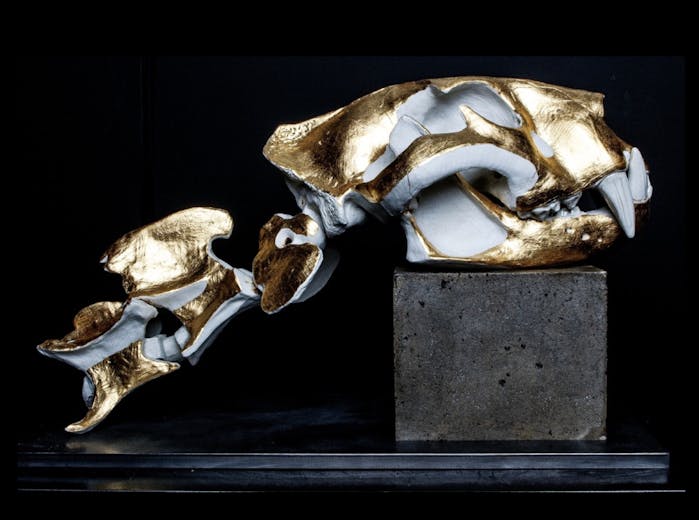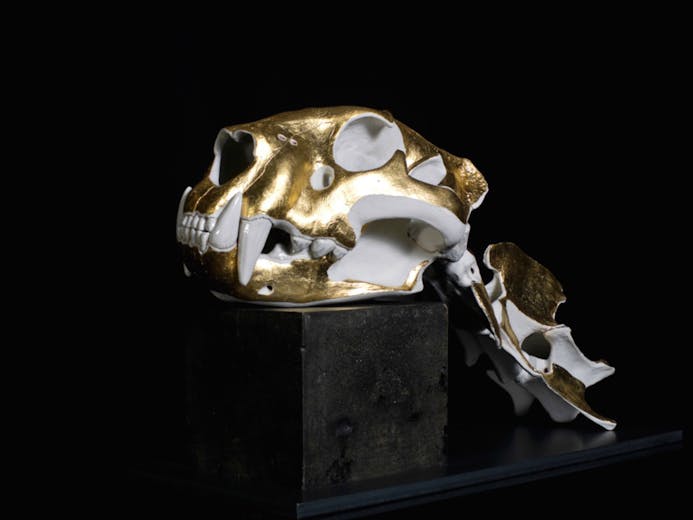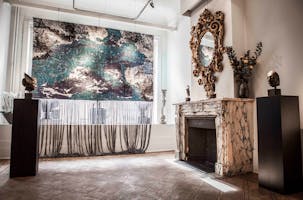Gold Tiger
James B. WebsterDetailed information of ArtWork
James B. Webster
Gold Tiger
Porcelain, gold leaves on a cement and steel base
46 x 28 x 20 cm
James B. webster
"TROPHIES"
2018: Messum Wiltshire, U.K
2017: Fairhurst Gallery, Norwich, UK // Desmet Gallery, Bruxelles, Belgium //
2016: Daniel Crouch Rare Books, London, U.K // YIA Art Fair, Paris, France // YIA Art Fair, Maastricht, Netherlands // Room Art Fair, Madrid Spain //
2015: Deyrolle, Paris, France// Roland Mouret, London, U.K // Chenel Gallery, Paris, France // Daniel Crouch Rare Books, London, U.K // YIA, Paris France
JAMES WEBSTER (born Suffolk, 1978) received classical training in
sculpture in Florence, Italy, where he worked as an apprentice to
Marianne Luchetti. Upon his return to the UK, he marked a detachment
from these classical roots with the inauguration of his first solo exhibition
of contemporary sculpture at the Rivington Gallery (London) in 2008. A
desire to plunge even further into anatomy, his passion, drove him to
then return to the countryside of Suffolk, Webster’s native region, where
he would spend long months isolated in his studio, studying his subjects
and not only striving to master the various techniques of ceramics but to
also further push the boundaries of his art.
TROPHIES consists of eight porcelain animal skulls and
vertebrae, ceremonially placed on concrete cubes fixed in
steel plate, organised in two rows of four sculptures facing
another like the Avenue of Sphinx at the Egyptian temple
in Karnak.
This is James Benjamin Webster’s first research in
porcelain. Working in this ancient and revered material,
JBW has developed a sense of real bone, a notion of the
past through new objects of precious value. As a Victorian
scientist would collect information and recreate their
findings; JBW has worked from real animal skeletons
through observation and memory.
The recent destruction of ancient icons and temples, along
with our latent neglect of the environment, has become an
integral discussion within JBW's work. He has attempted
to build a new monument to represent our past and our
future. Using ceramic instead of taxidermy, his working
process strives to idolise the living as if they have passed
already. He uses strong and vulnerable, precious and
throwaway materials to derive a sense of archaeology
Gold in the ancient world was the representation of the
sun and its light. The skulls are all under the sun with the
blue-grey shadows of the porcelain beneath. JBW's sense
of ritual and ceremony and its obligations played heavily
in the development of his work. This is not a sculpture
about death but a story of life.
Educated at the Norwich School and trained as an artist
in Florence, James Benjamin Webster (born Suffolk, 1978)
grew up in Norfolk, with a childhood discovering and
playing in the rich flora and fauna of the countryside and
listening to the stories and mythology read to him by his
grandfather
Unique work
Signed
Pristine
Contemporary
Bruxelles Belgium
Art Sablon, Rue Watteeu 16, Brussels, Belgium


